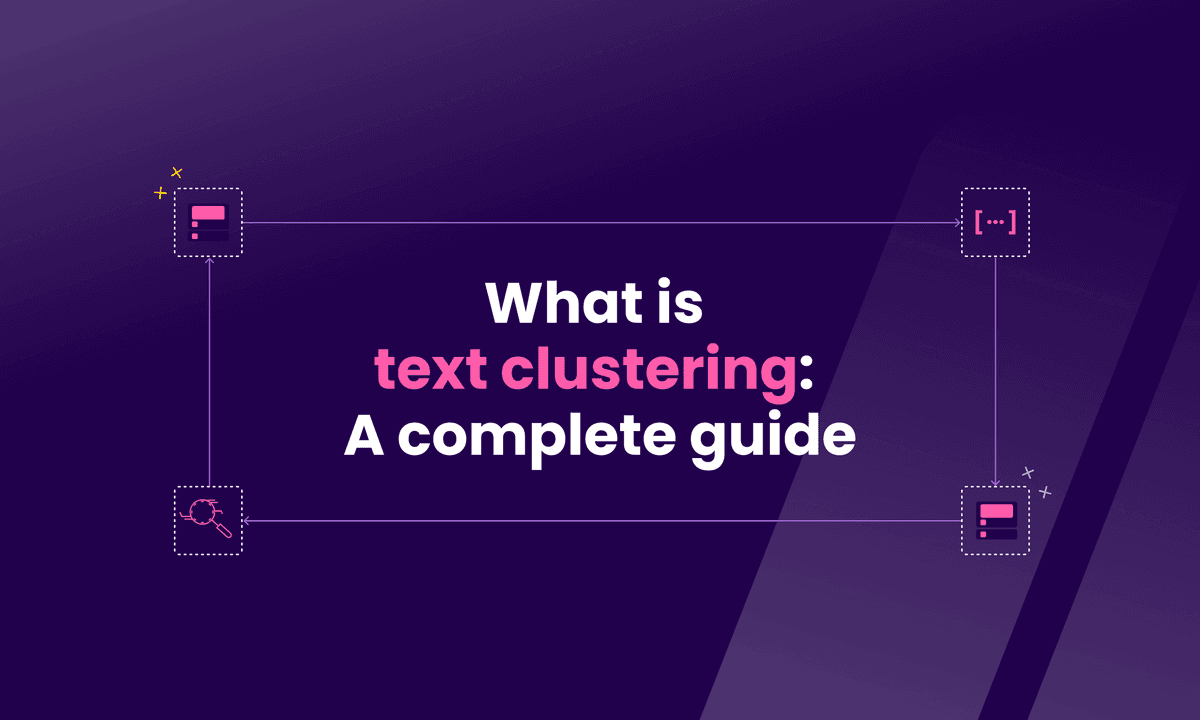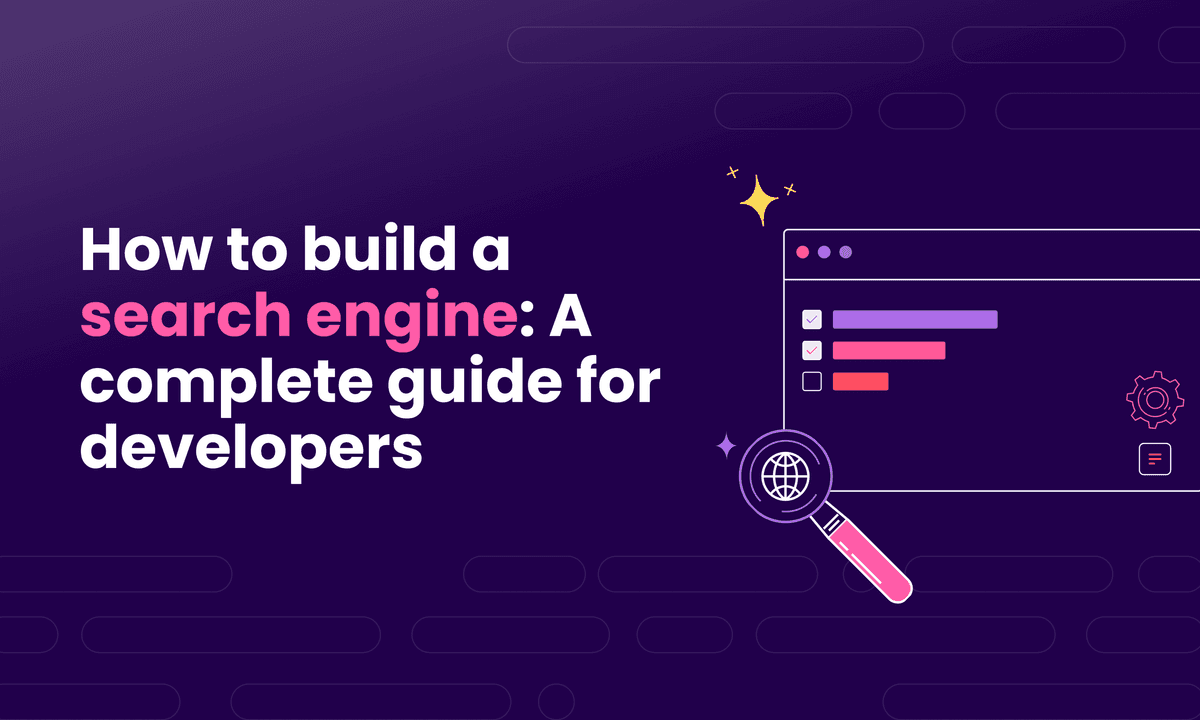Algolia review: The enterprise giant meets the developer favorite – Meilisearch
Algolia review: Powerful search-as-a-service with AI features & enterprise tools, but complex pricing. See why Meilisearch is the top alternative.
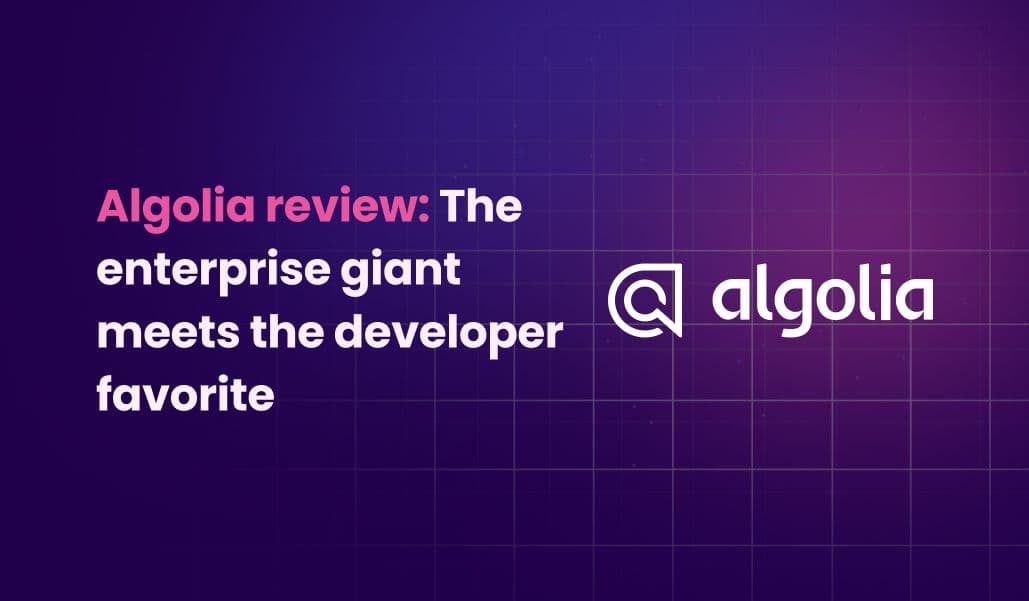
Algolia has established itself as the dominant force in search-as-a-service, powering over 1.75 trillion searches annually for more than 18,000 customers worldwide. With its sophisticated AI features, comprehensive merchandising tools, and enterprise-grade infrastructure, it has become the go-to solution for companies seeking to deliver premium search experiences on their own platforms.
But as search technology evolves and businesses evaluate their options, many are discovering that Algolia's extensive capabilities come with complexity and costs that don't align with every use case.
To create this Algolia review, I've analyzed the platform extensively. I believe it's the ideal choice if:
- You need comprehensive AI-powered search with advanced personalization
- You require sophisticated merchandising tools for e-commerce
- You have dedicated resources for implementation and optimization
- You're operating at enterprise scale with complex requirements
- You value having all search-related features in one platform
However, Algolia might not be the best choice if:
- You need a simple, straightforward search solution
- You prefer the flexibility of self-hosting your search infrastructure
- You have budget constraints or need predictable pricing
- You value open-source transparency and community-driven development
- You want to get started quickly without extensive configuration
In this case, you should consider Meilisearch: an open-source search engine that prioritizes simplicity and developer experience without sacrificing performance. With its lightning-fast results, intuitive API, and the flexibility to self-host or use managed cloud services, Meilisearch offers a great alternative for teams who want effective search without the enterprise complexity.
Because of that, I've included a detailed look at Meilisearch later in this Algolia review, as the best alternative for developers seeking simplicity over expertise. If you're ready to explore a more accessible approach to search, you can try Meilisearch Cloud with a 14-day free trial or download the open-source version to self-host.
What is Algolia?
Algolia was founded in 2012 by Nicolas Dessaigne and Julien Lemoine, two engineers who had previously worked together at Exalead, a search technology company.
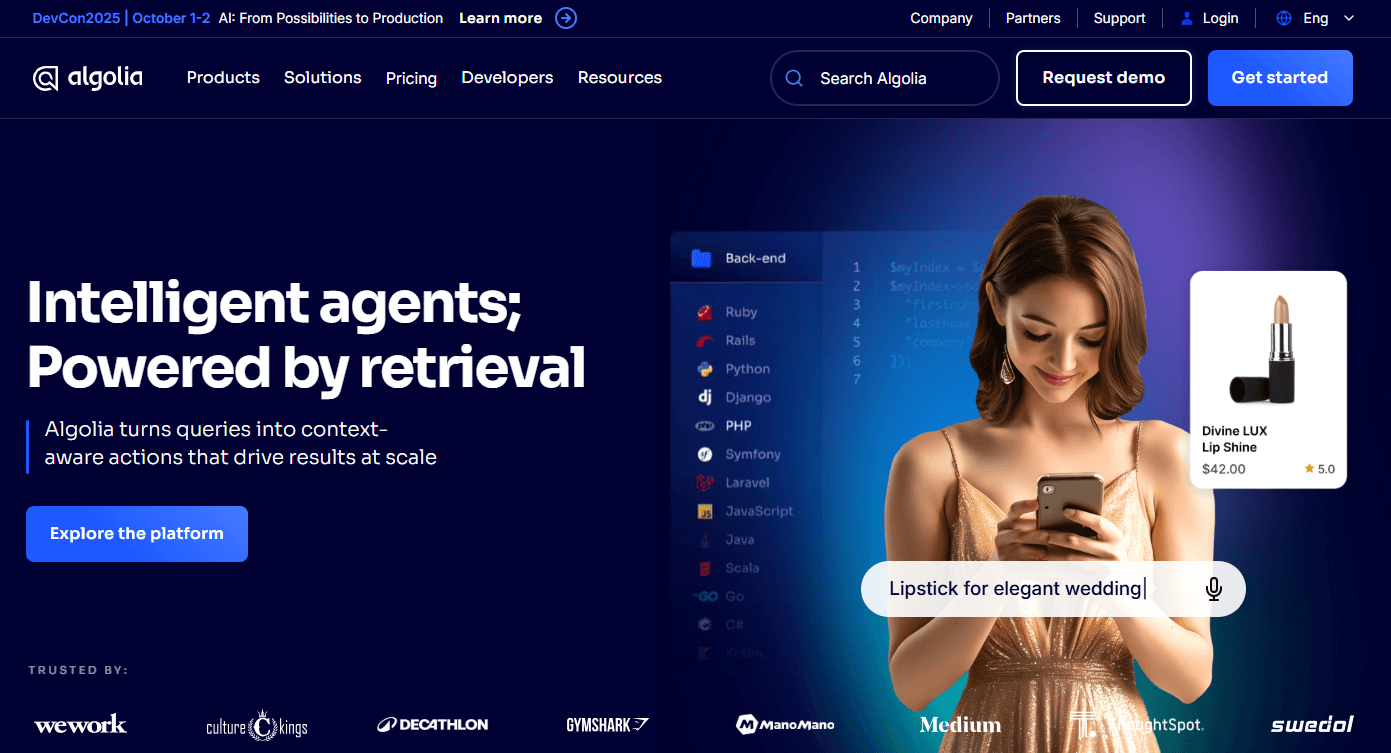
They identified a significant gap in the market: existing search technologies were slow, complex, and difficult to implement, particularly for real-time applications. Their mission was to provide developers with a powerful yet user-friendly API that would deliver consumer-grade search experiences.
The company initially focused on mobile search but pivoted to a cloud-based search-as-a-service model after participating in Y Combinator's Winter 2014 batch. This shift proved transformative, allowing Algolia to evolve from a developer tool into what it calls an "end-to-end AI Search and Discovery platform".
Today, Algolia serves major brands including Lacoste and Stripe, with the platform targeting response times under 100 milliseconds. The platform has expanded far beyond basic search to include AI-powered features like NeuralSearch for semantic understanding, Dynamic Re-Ranking for trend detection, and comprehensive merchandising tools for e-commerce optimization.
Algolia's ideal customers are enterprises and fast-growing companies that view search as critical to their user experience and revenue strategy. These organizations typically have the technical resources to implement and optimize the platform, and the budget to support premium pricing in exchange for comprehensive features and reliability.
Algolia Pros & Cons
| Pros | Cons |
|---|---|
| ✅ Lightning-fast search results (under 100ms) | ❌ Premium pricing can be expensive for smaller businesses |
| ✅ Comprehensive AI features including NeuralSearch | ❌ Steep learning curve for advanced features |
| ✅ Extensive merchandising and personalization tools | ❌ No self-hosting option available |
| ✅ Multiple platform integrations | ❌ Complex pricing based on searches and records |
| ✅ Enterprise-grade reliability (99.999% uptime available) | ❌ Limited support for non-premium plans |
| ✅ Powerful analytics and A/B testing capabilities | ❌ Vendor lock-in with proprietary technology |
Algolia Review: How it Works & Key Features
Search Infrastructure and Performance
At the core of Algolia is its Distributed Search Network (DSN), a globally distributed infrastructure that ensures search queries are processed by the nearest data center.
When you send data to Algolia, it creates optimized indexes using inverted index structures for rapid retrieval. The platform processes queries through multiple stages: tokenization, normalization, index lookup, and ranking, all happening in milliseconds.
InstantSearch delivers search results as users type, with each keystroke triggering a new search request. This creates the responsive experience that users expect. Algolia's infrastructure can handle massive scale, with some customers processing billions of searches per month while maintaining consistent sub-100ms response times.
AI-Powered Search Capabilities
Algolia's NeuralSearch combines traditional keyword search with semantic vector search in a single API.
The system uses Large Language Models to generate vector embeddings for both documents and queries, enabling it to understand context and meaning beyond literal keyword matches. This hybrid approach means a search for "warm clothes" can return results for "sweaters" and "jackets" even without those exact terms in the query.
Dynamic Re-Ranking automatically adjusts search results based on user behavior patterns over a 30-day window. Products or content that receive significant clicks or conversions for specific queries are boosted in future searches. The system requires at least 20 clicks or two conversions within the window to trigger re-ranking, with scores refreshing every 24 hours by default, or hourly with advanced plans.
The Personalization feature builds individual user profiles based on interaction history, creating affinity scores for categories, brands, and other attributes. These profiles, which are computed and refreshed periodically, influence search rankings. Businesses can weight different events (clicks, purchases, views) and facets (brand, category, color) to fine-tune the personalization strategy.
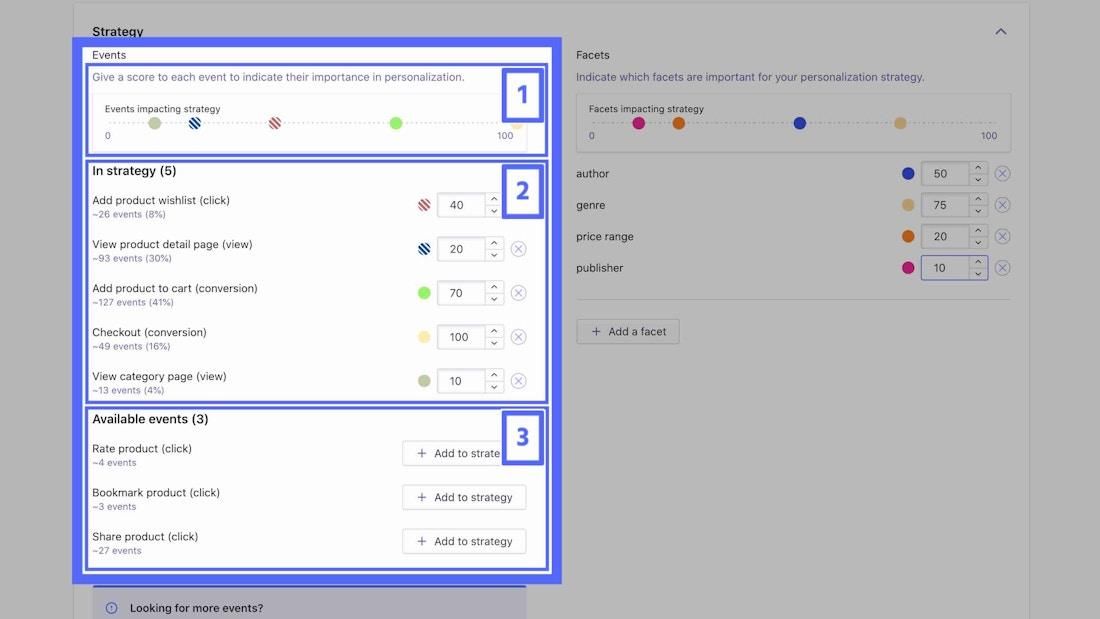
Source: Algolia
Merchandising and Business Tools
Algolia's Merchandising Studio provides a no-code interface for business teams to control search results without developer involvement.
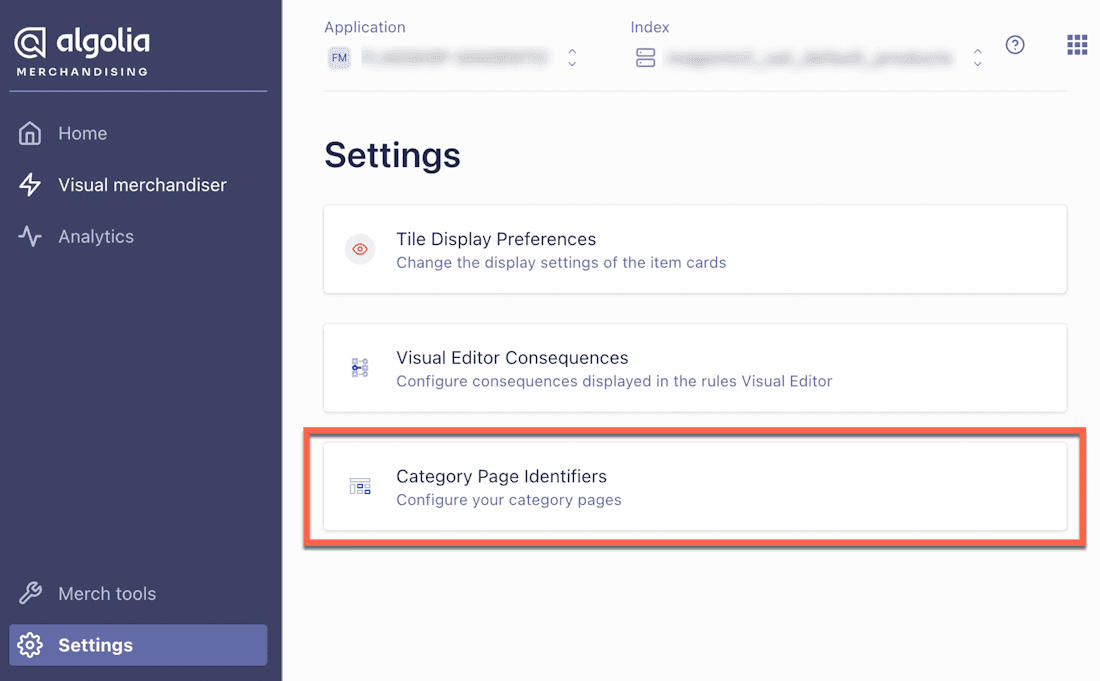 Source: Algolia
Source: Algolia
Users can create rules to promote specific products, hide others, or redirect searches to curated landing pages. The Visual Editor allows for drag-and-drop positioning of products in search results, while the Rules engine supports up to 10,000 rules per index on premium plans.
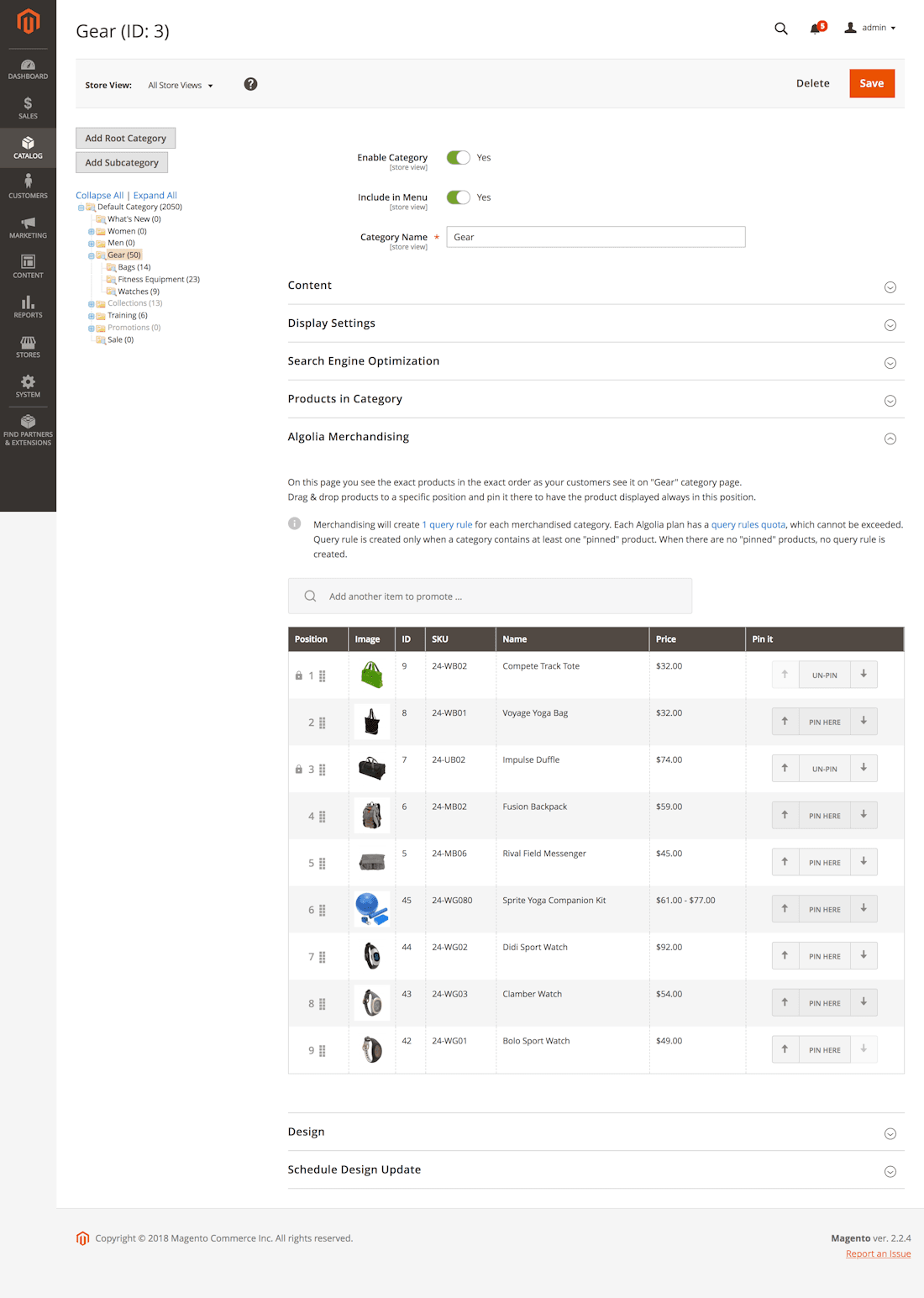 Source: Algolia
Source: Algolia
The platform includes comprehensive analytics that track search performance, click-through rates, conversion rates, and revenue attribution. The dashboard displays top searches, no-results queries, and filter usage patterns. For e-commerce specifically, Revenue Analytics connects search interactions directly to purchase data, allowing teams to assess the impact of search optimization efforts on revenue metrics.
A/B testing capabilities allow teams to compare different search configurations with live traffic. Tests can evaluate changes to ranking algorithms, synonyms, or merchandising rules, with automatic statistical analysis determining winners based on click-through and conversion metrics.
Developer Experience and Integration
Algolia provides API clients for Ruby, Python, PHP, JavaScript, Java, Go, C#, and additional languages.
The InstantSearch libraries offer pre-built UI components for React, Vue, Angular (though now deprecated), and vanilla JavaScript, enabling developers to build search interfaces quickly. These components include search boxes, results displays, refinement lists, pagination, and more, all customizable through CSS.
The platform integrates with major e-commerce platforms including Shopify, Magento, and BigCommerce through official plugins.
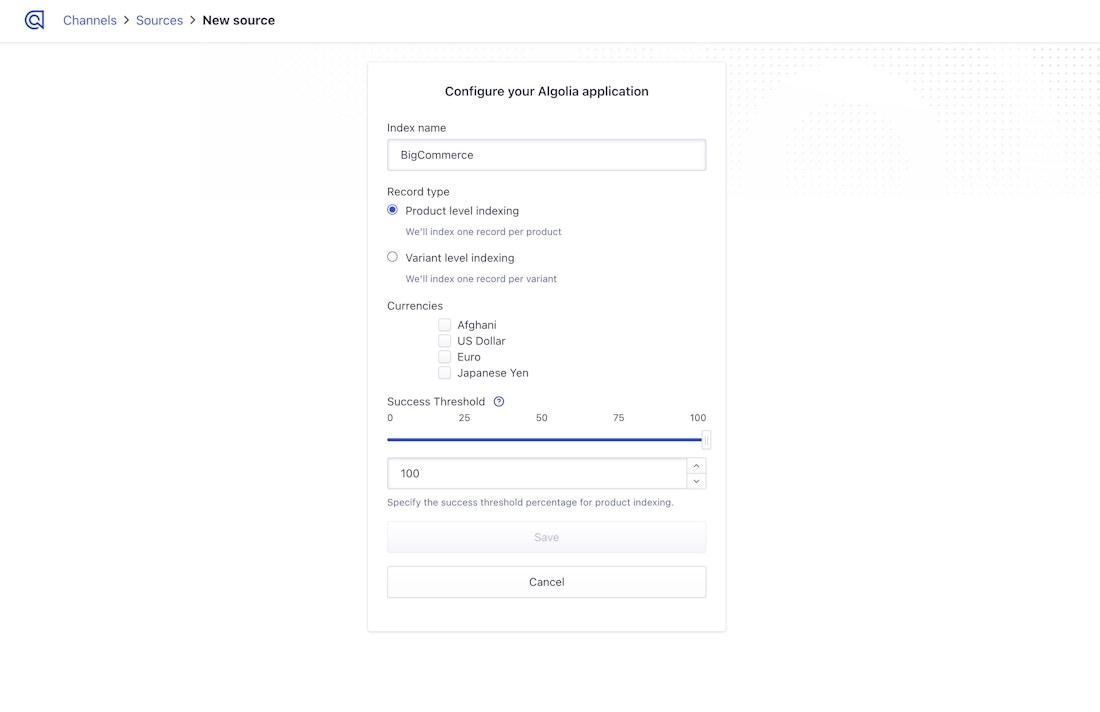 Source: Algolia
Source: Algolia
For content management, there are connectors for WordPress (third-party maintained) and Contentstack, among other CMS platforms. The REST API enables programmatic control over indexing, search, settings, and analytics, with different API keys providing granular access control.
While Algolia integrates with external webhooks from platforms like Shopify for automated indexing, it doesn't provide outgoing event webhooks for triggering external actions.
Where Algolia Falls Short
While Algolia excels as a comprehensive search platform, several limitations become apparent for certain users. These constraints reveal a platform optimized for enterprise complexity rather than simplicity and accessibility.
Cost and Pricing Complexity: The most frequently cited concern about Algolia is its pricing structure.
The platform uses a complex model based on both search requests and records stored, with only one pricing approach available, which can lead to unpredictable costs as usage scales. Many users report bill shock when their search volume grows, with costs escalating from hundreds to thousands of dollars monthly. While lower tiers have transparent pricing, premium plans require sales conversations before potential customers can assess affordability.
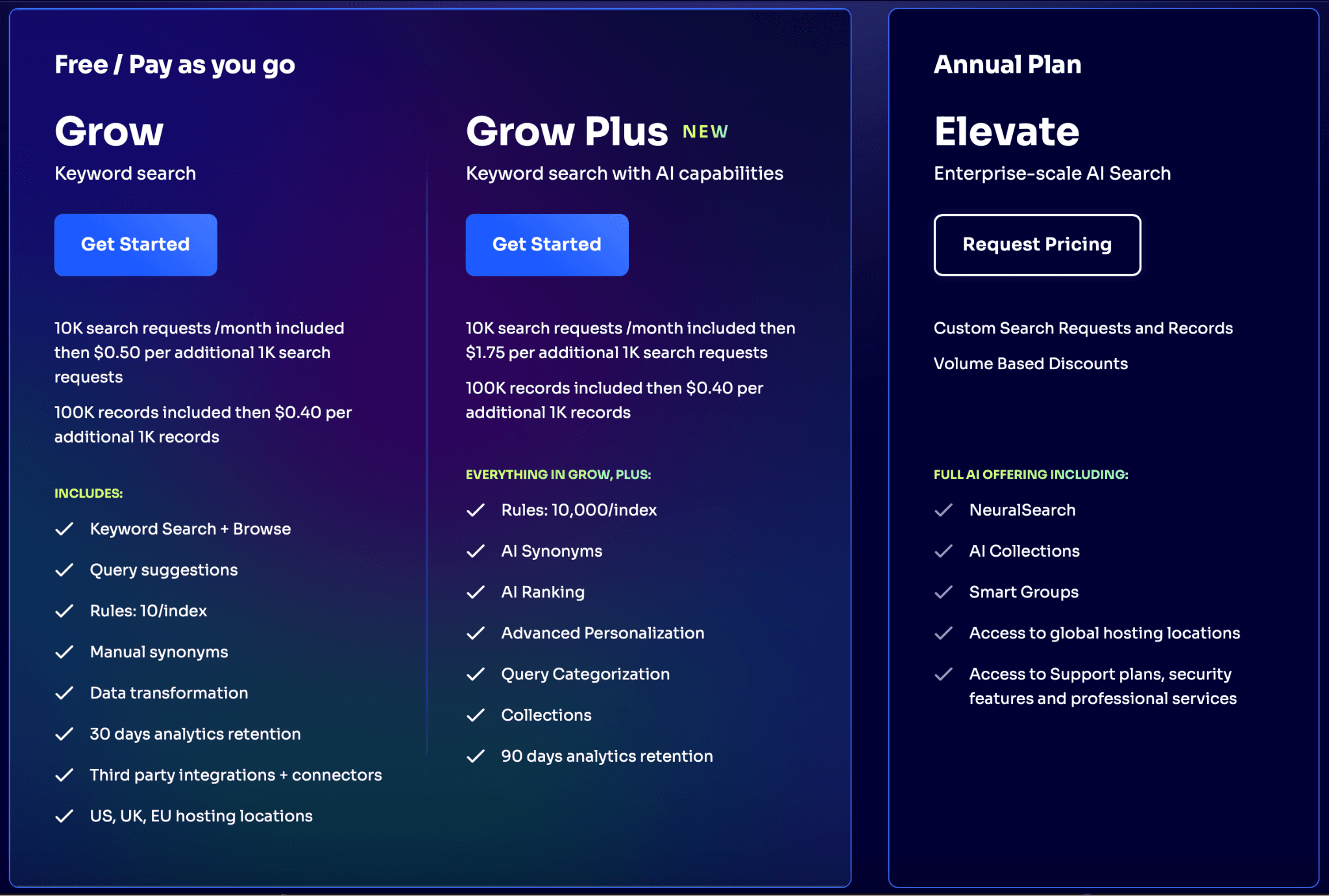
Overwhelming for Simple Needs: Algolia's extensive feature set can be overwhelming for teams that just need basic search functionality.
The platform includes AI features, merchandising tools, personalization engines, and analytics dashboards that many smaller projects simply don't need. This complexity extends to implementation, where achieving optimal relevance often requires deep understanding of ranking algorithms, custom attributes, and index configuration.
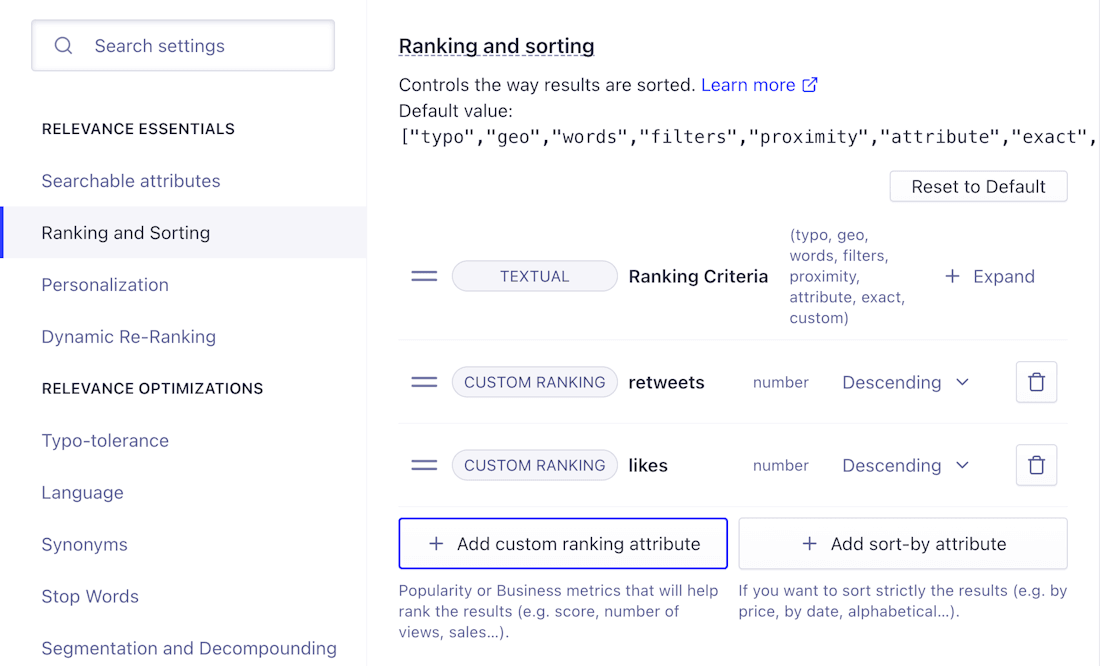 Source: Algolia
Source: Algolia
No Self-Hosting Option: As a proprietary SaaS platform, Algolia doesn't offer a self-hosted version. This creates vendor lock-in and raises concerns for organizations that need to maintain control over their infrastructure or have specific compliance requirements. Companies must trust Algolia with their data and accept the risk of service changes or pricing increases.
Support Limitations: Users on non-enterprise plans frequently report frustration with customer support. While enterprise customers receive dedicated support, those on standard plans often experience slow response times or find themselves directed to documentation rather than receiving personalized assistance. For a premium-priced product, this level of support feels inadequate to many customers.
These limitations aren't failures but rather the natural result of building an enterprise-focused platform. However, they create clear opportunities for alternatives that prioritize simplicity, transparency, and developer autonomy.
Top Algolia Alternative: Meilisearch
Meilisearch addresses Algolia's complexity and accessibility challenges by taking a different approach to search.
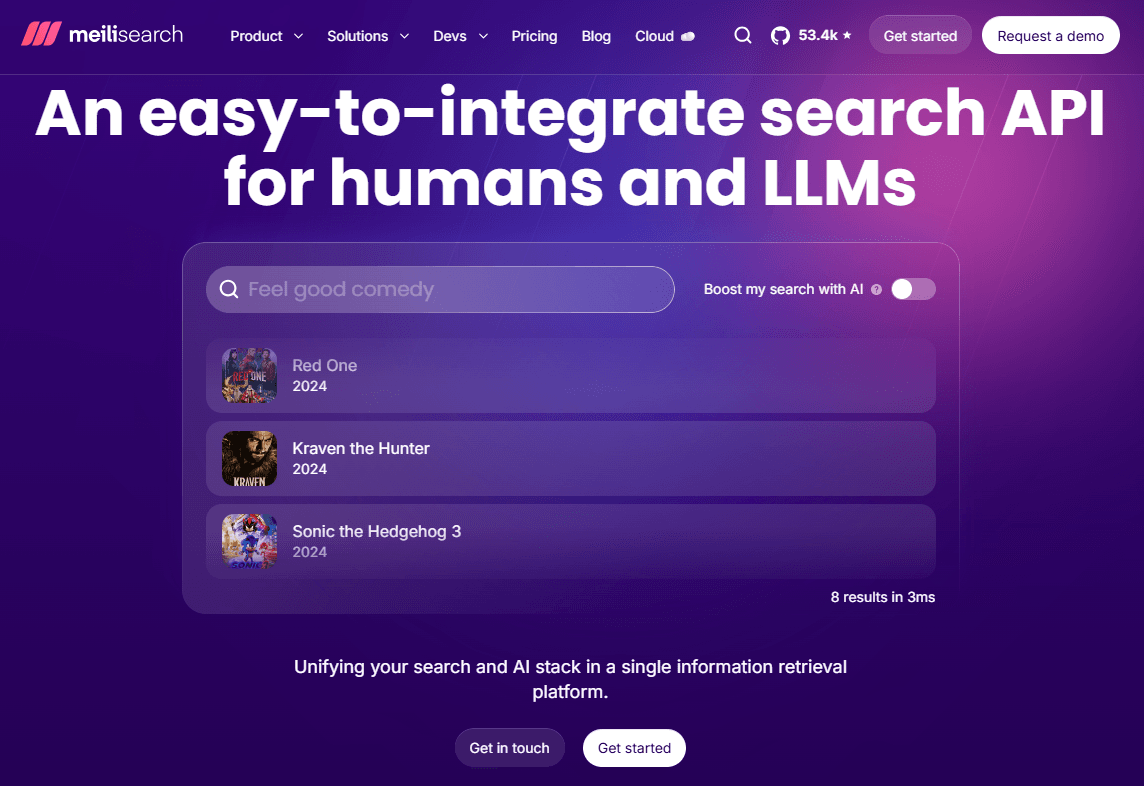
Founded in 2018 by developers who were frustrated with existing search solutions, Meilisearch is built on the principle that effective search shouldn't require extensive configuration or enterprise budgets.
Open-Source Philosophy
At its core, Meilisearch is open-source software distributed under the MIT license.
This means you can download, modify, and deploy it on your own infrastructure without any licensing fees. The codebase is publicly available on GitHub with over 40,000 stars, fostering a transparent development process and active community contribution.
This open-source nature provides several advantages.
Organizations maintain complete control over their search infrastructure and data. There's no vendor lock-in; if Meilisearch's direction changes or the company ceases to exist, the software continues to work and evolve through community support. The self-hosted option also addresses compliance and data sovereignty requirements that proprietary SaaS solutions can't meet.
For those who prefer managed services, Meilisearch Cloud offers the convenience of a hosted solution while maintaining the same transparent approach. What makes Meilisearch unique is its dual pricing model: customers can choose between subscription-based pricing starting at $30 per month for 50,000 searches and 100,000 documents, or resource-based pricing that allows payment based on actual resource consumption. This flexibility is particularly valuable for larger customers who need cost predictability as they scale, solving the overage unpredictability issues common with single-model pricing approaches. The Cloud version includes a 14-day free trial to get started, while the self-hosted open-source version remains free forever (though with fewer features than the Cloud offering).
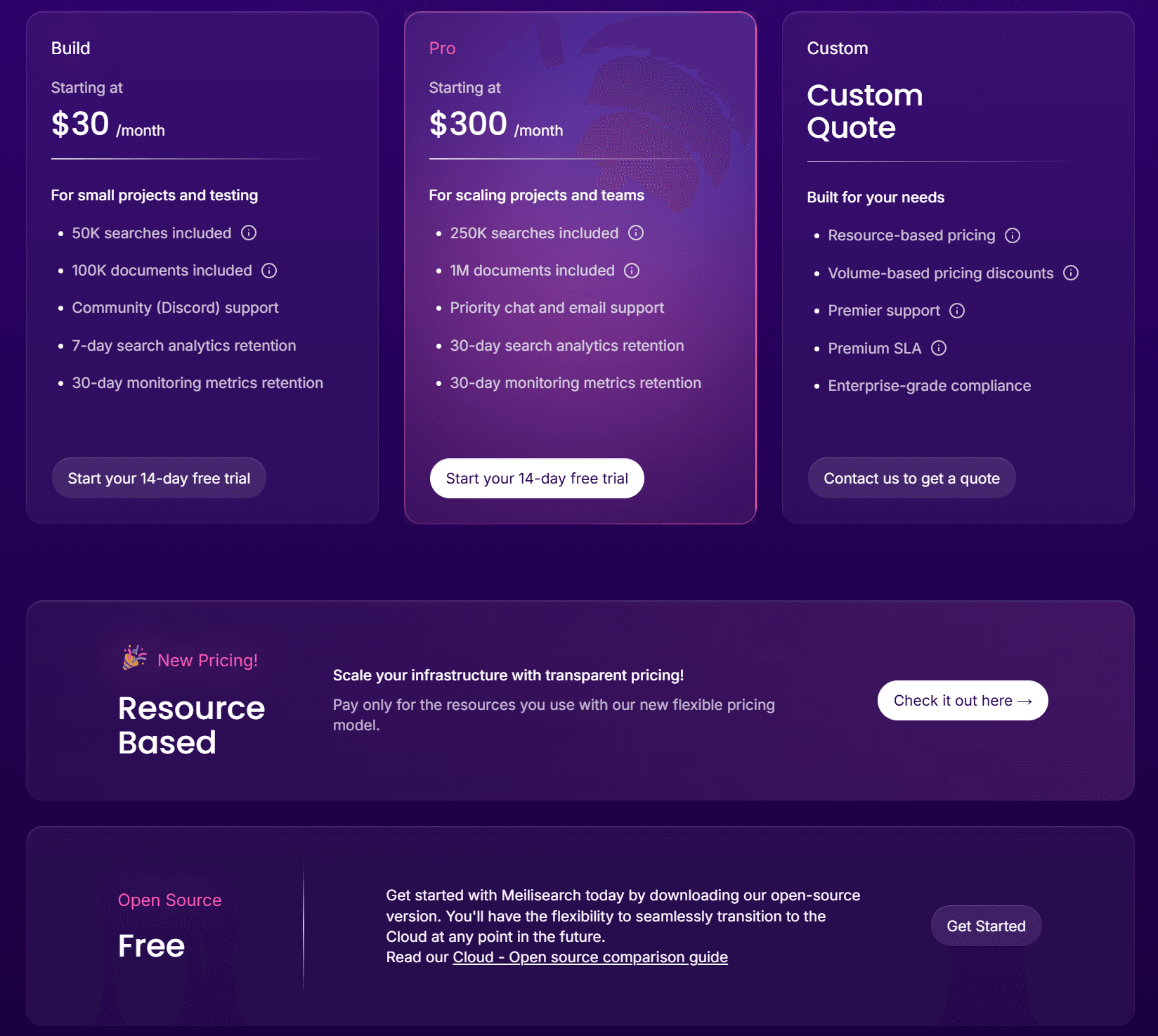
Simplicity Without Sacrifice
Meilisearch delivers powerful search capabilities through an intentionally simple interface.
The REST-ful API is intuitive and well-documented, with most developers able to implement basic search functionality quickly. Default settings work effectively out-of-the-box, providing typo tolerance, relevant rankings, and fast results without configuration.
 Source: Meilisearch
Source: Meilisearch
Setup involves three basic steps: creating an index, adding documents, and performing searches. The search engine automatically handles tokenization, normalization, and inverted index creation. Ranking rules follow a logical sequence: words, typo, proximity, attribute, sort, and exactness. While these rules are customizable, the defaults deliver strong relevance for most use cases.
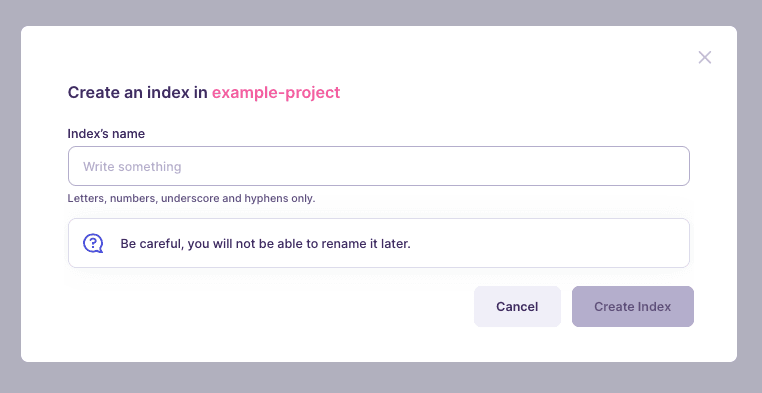 Source: Meilisearch
Source: Meilisearch
The platform supports essential features including filtering, faceted search, sorting, synonyms, and geosearch. Each feature is implemented thoughtfully; for example, typo tolerance allows one typo in words with five or more characters and two typos for words with nine or more characters, but these settings are easily adjustable through the API.
Performance Excellence
Written in Rust, Meilisearch prioritizes speed at every level.
Search results typically return in under 50 milliseconds, enabling true search-as-you-type experiences. The platform uses a Lightning Memory-Mapped Database (LMDB) for storage, providing efficient data access with low memory overhead.
Indexing performance often exceeds competitors, with benchmarks showing faster indexing times than Elasticsearch for many datasets. The system uses intelligent batching to optimize document processing, automatically grouping similar operations for improved output.
While Meilisearch primarily scales vertically rather than horizontally, this architectural choice contributes to its simplicity and performance for datasets up to hundreds of millions of documents.
Modern AI Capabilities
Meilisearch recently introduced hybrid search capabilities that combine traditional keyword search with semantic vector search.
This feature works with various embedding providers including OpenAI, Hugging Face, or custom models. Developers can configure document templates to specify which fields contribute to embeddings, improving the quality of semantic matching.
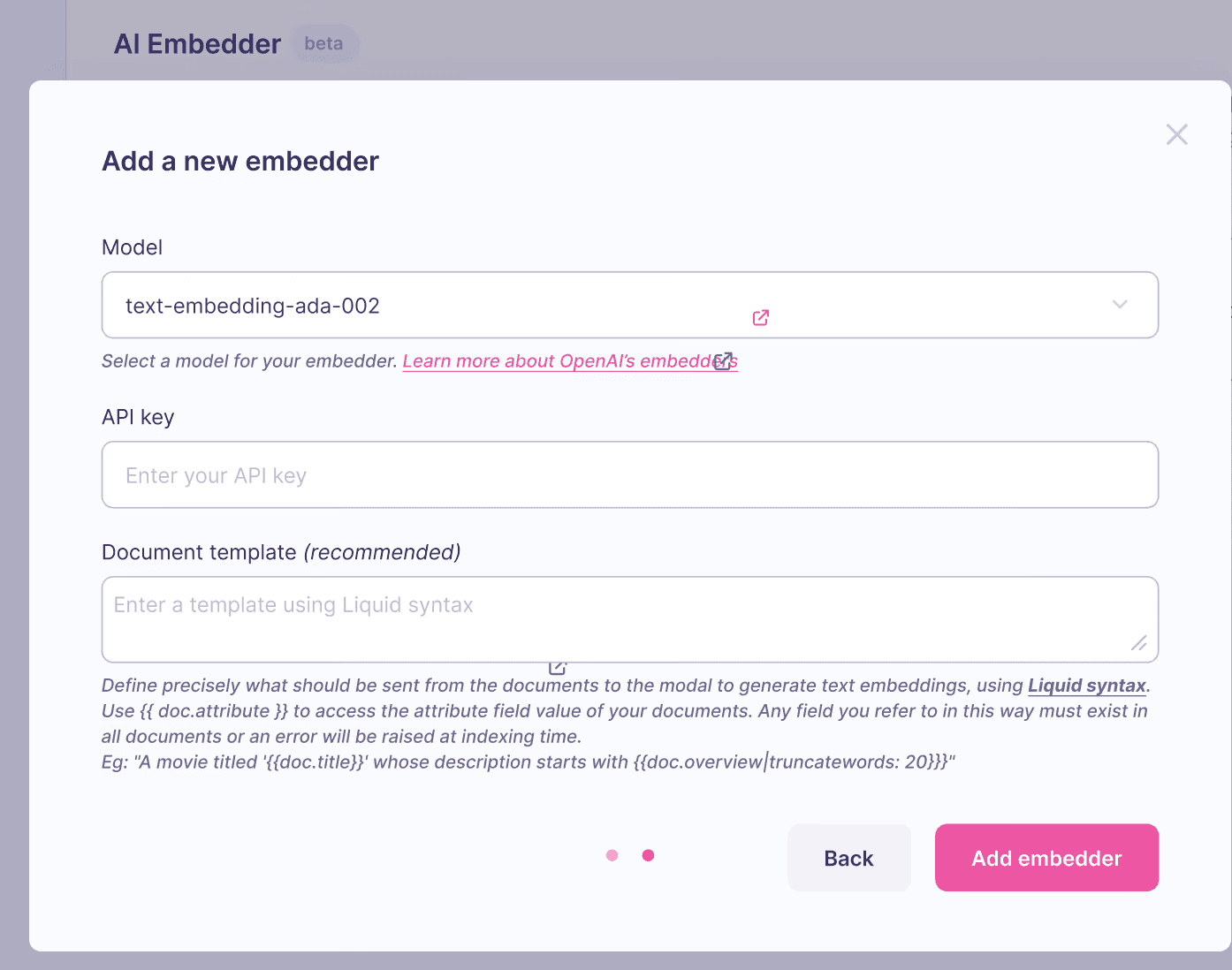
The hybrid search API unifies both search types, with a configurable semantic ratio parameter controlling the balance between keyword and semantic results. This allows developers to fine-tune results based on their specific use case, from pure keyword matching to fully semantic search.
Algolia or Meilisearch: Comparison Summary
| Aspect | Algolia | Meilisearch |
|---|---|---|
| Deployment Options | Cloud-only (SaaS) | Self-hosted or Cloud |
| Pricing Model | Single usage-based pricing model | Dual model: usage- or resource-based |
| Open Source | ❌ Proprietary | ✅ MIT License |
| Setup Complexity | ⭐⭐⭐ Requires configuration | ⭐⭐⭐⭐⭐ Works out-of-the-box |
| AI Capabilities | ⭐⭐⭐⭐⭐ Extensive (NeuralSearch, Personalization) | ⭐⭐⭐⭐ Hybrid search |
| Enterprise Features | ⭐⭐⭐⭐⭐ Comprehensive merchandising, analytics | ⭐⭐⭐ Core search focused |
| Performance | ⭐⭐⭐⭐⭐ Sub-100ms globally | ⭐⭐⭐⭐⭐ Sub-50ms typical |
| Documentation | ⭐⭐⭐⭐ Comprehensive | ⭐⭐⭐⭐⭐ Clear and approachable |
| Best For | Large enterprises, e-commerce platforms | Developers, startups, SMBs |
Final Verdict
The choice between Algolia and Meilisearch ultimately depends on your organization's priorities and resources.
👉 Choose Algolia if you're an enterprise that needs a comprehensive search platform with extensive AI capabilities, advanced merchandising tools, and global infrastructure.
It's ideal when search directly drives revenue, you have dedicated technical resources for implementation and optimization, and you require advanced features like personalization, A/B testing, and detailed analytics. The premium pricing is justified when you need every possible search feature integrated into a single platform.
Get started with Algolia here.
👉 Choose Meilisearch if you value simplicity, transparency, and developer experience. It's perfect for teams that want powerful search without complexity, need the flexibility to self-host or use managed cloud services, and prefer predictable costs with open-source transparency. Meilisearch's unique dual pricing model (subscription-based or resource-based) provides flexibility that single-model competitors like Algolia cannot match, making it particularly valuable for organizations that need cost predictability as they scale. Meilisearch proves that exceptional search doesn't require enterprise complexity or budgets, making it accessible to developers, startups, and businesses of all sizes.
Get started with Meilisearch here.
Both platforms deliver fast, relevant search results. The fundamental difference lies in their philosophy: Algolia provides a comprehensive enterprise platform with extensive features, while Meilisearch focuses on making powerful search simple and accessible. Your choice depends on whether you need enterprise expertise or developer simplicity.
Ready to experience search that's powerful AND simple?
Whether you're building a new project or migrating from a complex search solution, Meilisearch delivers fast, relevant results without the enterprise overhead. With flexible deployment options, transparent pricing, and a developer-friendly API, you can get started in minutes instead of weeks.
